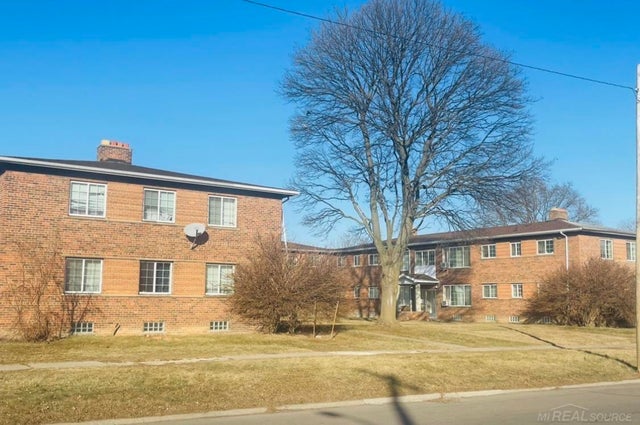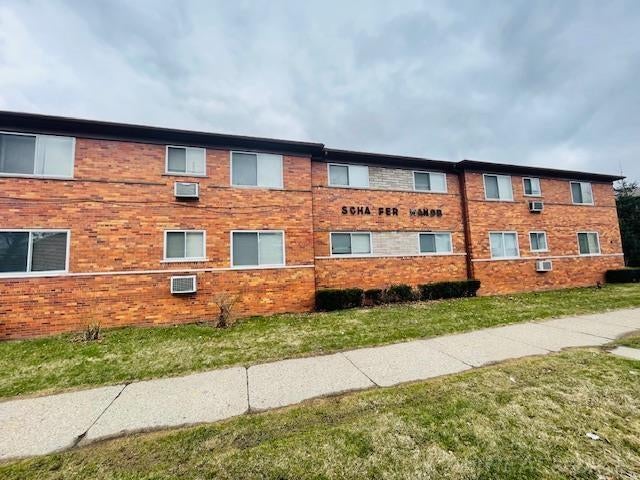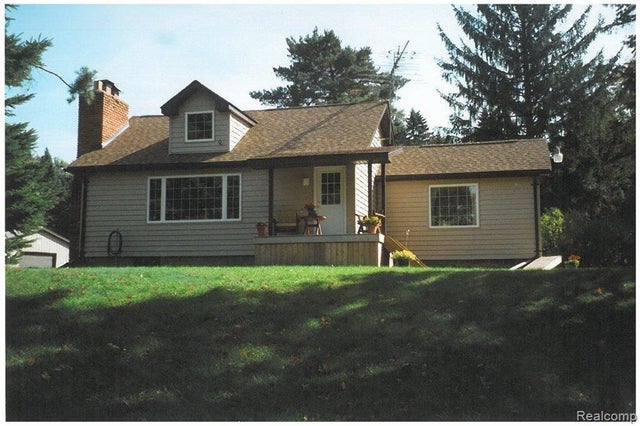Selling your home is a big decision, and in Michigan it involves more than just finding a buyer and signing papers. Michigan has specific legal steps every seller must follow – from the moment you list your home to the day you close the deal. Missing a step or skipping a required disclosure could delay your sale or even land you in legal trouble. But don’t worry! In this friendly guide, we’ll walk you through each step in plain English, with pro tips and examples (from right here in Metro Detroit) to make the process easier.
By the end, you’ll know exactly what to expect: the forms you need to fill out, the laws you need to follow, and how to tackle everything from listing to closing with confidence. We’ll also highlight how The Perna Team – one of Michigan’s top-selling real estate teams – helps home sellers navigate these steps seamlessly. Let’s dive into the step-by-step legal guide to selling your house in Michigan!

Step 1: Confirm Your Legal Ownership and Rights to Sell
Before you put your Michigan house on the market, make sure you have the legal right to sell it. This might sound obvious (you’re the owner, right?), but it’s an important first step. Double-check whose name is on the deed and how the property is titled. If you co-own the home with a spouse or someone else, or if you inherited the property, you’ll want to verify that all proper owners are accounted for. Only the legal owners can sign the documents to transfer the home to a buyer.
For example: A Metro Detroit couple once assumed they both owned their home, but when preparing to sell, they discovered only the husband’s name was on the deed (he had bought the house before marriage and never added his wife). In that case, legally only he needed to sign the transfer documents. Imagine if they hadn’t caught that – it could have caused confusion or delays at closing. By confirming up front who the owners are, you ensure everyone who needs to sign off on the sale is on the same page from day one.
Pro Tip: Locate your property deed (the document you received when you bought the home) or get a copy from your county recorder’s office. Make sure it correctly lists your name (and anyone else with an ownership interest). If there’s a discrepancy – say an ex-spouse or relative is still on title – address it before listing. This might involve recording a new deed or legal document to clear up ownership. It’s much easier to handle these issues now than when you’re in the middle of a sale.
Finally, if you have a mortgage or any liens (like a home equity loan or a tax lien) on the property, know that these will need to be paid off during the sale. You don’t necessarily need to do anything about them yet, but being aware of any debts secured by the home will prepare you for Step 7 when we discuss clearing the title.
Step 2: Hire a Great Michigan Agent and Sign a Listing Agreement
With your ownership confirmed, it’s time to choose a real estate agent and get your home officially on the market. While you’re not legally required to use an agent in Michigan, having an experienced local agent can be invaluable – especially for navigating all the legal steps and paperwork. A professional agent will guide you through pricing, marketing, and negotiations, but first comes an important legal document: the Listing Agreement.
Signing the Listing Agreement
When you decide to work with a real estate agent (like The Perna Team), you’ll sign a contract called a Listing Agreement. This document legally authorizes your agent to market and sell your home, and outlines the terms of your partnership. It will include details like:
- List Price: The price at which you’ll initially list your home for sale.
- Commission: The fee you agree to pay the agent (usually as a percentage of the sale price) for their services. This is typically paid at closing out of the sale proceeds.
- Duration: How long the agreement lasts (e.g. 3 months, 6 months).
- Agent’s Duties: What the agent will do – for example, list the property on the MLS (Multiple Listing Service), handle showings, advertise the home, and represent your interests in negotiations.
- Seller’s Duties: Your responsibilities, like making the home available for showings and providing required information about the property.
Read the listing agreement carefully before signing. It is a binding legal contract. If there’s anything you’re unsure about, ask your agent to explain it. Reputable agents will be transparent and make sure you’re comfortable with every detail. For instance, The Perna Team uses clear, plain-language listing agreements and we walk our clients through each section, so there are no surprises.
Pro Tip: When choosing an agent, look for a track record of success in Michigan. Don’t be afraid to ask for references or about the agent’s experience in your city or neighborhood. The housing markets in Metro Detroit communities can vary (selling a condo in Detroit is different from selling a house in Novi or South Lyon). An agent who has sold many homes in your area will understand local pricing trends and any city-specific requirements. Interview at least two agents if you can, and choose the one you trust the most. Given that The Perna Team is the #1 home-selling team in Michigan, helping over 8,000 families buy or sell homes (and earning 2,900+ five-star reviews in the process), we obviously believe having a seasoned team on your side makes a huge difference!
Once you sign the listing agreement, your agent is officially working for you. Now it’s time to get your home ready for the market and tackle the key legal paperwork all Michigan home sellers must prepare.
.png)
Step 3: Prepare the Required Seller’s Disclosure Documents
One of the most important legal steps in selling a house in Michigan is disclosure. Michigan law requires home sellers to fill out a Seller’s Disclosure Statement and give it to prospective buyers before a purchase agreement is signed. This document is essentially a checklist of what you know about the condition of your property – and it’s required by the Michigan Seller Disclosure Act (Act 92 of 1993). Failing to provide this disclosure in a timely manner can give the buyer the right to back out of the deal, even after you’ve agreed on a price. So let’s break down what you need to do:
Michigan Seller’s Disclosure Statement
The Seller’s Disclosure Statement is a form that covers all sorts of details about your house, such as the condition of the roof, plumbing, heating, electrical systems, appliances, and more. You’ll also disclose whether you know of any problems like basement leaks, past flooding, pest infestations, environmental issues, pending legal actions, etc. Essentially, you’re answering a series of yes/no questions about your home’s features and any known defects. You must answer honestly and in good faith – the law requires it. This doesn’t mean you have to go digging for problems or pay for an inspection (unless you choose to), but you can’t hide known issues. If you’re aware of a defect, you have to disclose it.
Michigan provides a standard form for this disclosure. Your real estate agent will give it to you (or you can find it via the Michigan Legislature’s website). The form’s exact language is set by law, so everyone uses essentially the same form. Fill it out as completely as you can. Once it’s filled out, your agent will make it available to any potential buyers. In fact, by law, buyers should receive this statement before or at the time they make a written offer, and definitely before you accept an offer. If a buyer makes an offer and hasn’t seen your disclosure yet, you can still provide it and proceed – just ensure they get it before you formally accept and sign the purchase agreement.
Pro Tip: Complete the Seller’s Disclosure as soon as you list your home – don’t wait until an offer comes in. Your agent can even put copies out during showings or open houses. Providing the disclosure early builds trust with buyers and prevents any delay or cancellation due to late delivery. Remember, if you deliver the disclosure after signing a purchase contract, the buyer has the right to terminate the agreement within a short window – a headache you can easily avoid by being proactive.
Lead-Based Paint Disclosure (for older homes)
If your house was built before 1978, federal law (and Michigan law) also requires an additional disclosure about lead-based paint. Older homes may contain lead-based paint, which poses health risks, especially to children. As a seller, you must fill out a Lead Paint Disclosure form to tell buyers whether you have any knowledge of lead paint in the home. Even if you have no idea (which is common), you still need to provide the form indicating that. You’ll also need to give buyers a federally approved pamphlet titled “Protect Your Family from Lead in Your Home,” which explains the dangers of lead. (Your agent or title company often has copies of this pamphlet, or you can download it from the EPA’s website.)
The lead disclosure form is usually a simple checklist where you, the seller, note if you know of any lead paint in the home and provide any relevant records. Buyers then sign to acknowledge they received this information and the pamphlet. They also get the right to do a lead inspection within 10 days if they want (or they can waive that right). Make sure this form is completed and signed by both you and the buyer and kept with your contract. Your agent will help coordinate this at the right time (usually, it’s presented along with the purchase agreement).
Other Required Documents and Local Regulations
Beyond the statewide disclosure forms, be aware of any local requirements in your city or township. Some Michigan municipalities have their own rules when a property changes hands:
- City Inspections/Certificates: A few cities in Metro Detroit require a city inspection and a certificate of occupancy or code compliance before you can sell. For example, the City of Trenton mandates a city inspection of the home prior to sale and requires the seller to obtain an occupancy certificate (with a fee). If your city has a “point-of-sale” inspection ordinance, you’ll need to schedule that and possibly complete certain repairs or improvements the city insists on before closing. Your real estate agent should know if your area has any such requirement (The Perna Team always checks this for our listings). Not all areas do, but it’s worth asking. Detroit, for instance, doesn’t require a general home inspection for sales, but does require that any outstanding water bills are paid at closing (unpaid water/sewer charges can become a lien on the property). So in Detroit, sellers must request a final water reading and pay the final bill as part of the closing process. Each city can be a little different.
- Well/Septic Inspections: If your property is not on city water or sewer, some counties (or buyers) may require testing of well water or an inspection of the septic system. For instance, a rural home in Livingston County might need a septic inspection as part of the sale. This isn’t a statewide law, but rather a common practice or local rule. Again, your agent can guide you if this applies.
- Homeowners Association (HOA) Documents: If your home is in a homeowners association or condo association, you’ll likely need to provide the association bylaws, rules, regulations, and financial statements to the buyer. Michigan law gives condo buyers a certain number of days to review condo documents (often 9 days) and cancel the sale if they find something unsatisfactory. While the seller’s legal obligation is usually just to cooperate in providing these documents, it’s good to have them ready. The Perna Team, for example, will help you gather the HOA disclosure documents early so the buyer can review them promptly.
Michigan Home Sellers’ Document Checklist: (Make sure you have these ready to go!)
- Seller’s Disclosure Statement – Required by Michigan law for virtually all residential sales.
- Lead-Based Paint Disclosure – Required for homes built pre-1978 (federal law, enforced in MI).
- Local Inspection Certificate – If required by your city (e.g., Trenton’s inspection requirement).
- Well/Septic Reports – If applicable, for rural properties or if the buyer requests.
- HOA/Condo Documents – If applicable, provide bylaws, financials, etc., for the new owner’s review.
By completing all necessary disclosure forms and gathering any local documents upfront, you’ll set the stage for a smooth transaction. Buyers will appreciate your thoroughness, and you’ll greatly reduce the risk of legal issues popping up later.
.png)
Step 4: Price Your Home and List It on the Market
With paperwork in hand, you’re ready to list your Michigan home for sale. This step might not seem “legal” in nature, but how you list and market your home can have legal implications. Plus, getting the pricing and presentation right will set you up for a successful sale (which makes the later legal steps much easier!).
First, work with your agent to determine a competitive asking price. In Michigan’s current market, especially around Metro Detroit, pricing is crucial. Price too high and your home could sit with no offers; price too low and you might leave money on the table. A good agent will do a Comparative Market Analysis (CMA) – basically, research what similar homes in your area have sold for recently – to help guide your price. For example, if you’re selling a home in Northville or South Lyon, your agent will look at recent sales in those communities (accounting for the home’s size, condition, features, etc.). Michigan’s real estate market in 2025 has been quite active, and in some neighborhoods, homes still get multiple offers. You’ll want a price that attracts buyers but also maximizes your profit.
Next, your agent will put your home on the Multiple Listing Service (MLS), which feeds sites like Zillow, Realtor.com, and thepernateam.com. The listing will include a detailed description of your property, professional photos, and maybe even a 3D tour or video. It’s important that everything in your listing description is accurate and not misleading – that’s the legal angle. Don’t claim the roof is “new” if it’s 15 years old, for instance. Misrepresentation in advertising could potentially lead to issues later (and besides, the buyer’s inspection will reveal the truth anyway). Honesty is the best policy when marketing your home.
Preparing Your Home for Sale
While not a law, taking time to prepare your home can greatly affect your sale’s success. This includes cleaning, decluttering, making minor repairs, and perhaps staging. A well-presented home not only sells faster but can also prevent legal squabbles. How so? If your home is in good repair and shows well, buyers are less likely to find problems during inspections (Step 6) or accuse you of hiding defects. For instance, if you fix that loose railing or leaky faucet now, it’s one less issue for a buyer to raise later. Many Metro Detroit sellers even opt to do a pre-inspection before listing – hiring a home inspector to check the home and address any major issues proactively. This isn’t required, but it can be a smart move for older homes. At the very least, address known issues or disclose them clearly (as per Step 3) so buyers are informed upfront.
Pro Tip
Invest in quality photography and marketing. Most buyers in Michigan start their home search online. Bright, clear photos and a compelling description will draw more interest. Highlight features that Southeast Michigan buyers love – for example, “finished basement perfect for a home theater,” “spacious backyard great for summer BBQs,” or “walking distance to downtown Royal Oak.” The Perna Team provides professional staging consultations and high-end photography for our listings, because first impressions matter. A well-marketed listing can lead to more showings, more offers, and ultimately better terms when you go to contract. Legally, it doesn’t add new obligations, but it certainly helps achieve a smoother and more profitable sale.
Once your home is listed, be prepared to accommodate showings. Your agent will manage the scheduling, but you’ll need to keep the home tidy and accessible. It might feel a bit inconvenient, but remember the goal: finding the right buyer who will pay the right price. And thanks to the groundwork you’ve laid, that buyer will already have your disclosure statements in hand and hopefully feel confident making an offer. Speaking of which, let’s move on to what happens when the offers start coming in.
.png)
Step 5: Negotiate Offers and Sign the Purchase Agreement
Here’s where things get exciting – you’ve got an interested buyer (or maybe several) and an offer on the table! Now it’s time to negotiate the terms of the sale and sign a Purchase Agreement, which is the legally binding contract between you (the seller) and the buyer. This step is critical; the Purchase Agreement outlines everyone’s rights and obligations and ultimately is what makes the sale official. Let’s break it down:
Reviewing and Negotiating Offers
When a buyer wants to purchase your home, they will submit a written offer, usually using a standard Michigan Purchase Agreement form (often prepared by their real estate agent). This offer will include key terms such as:
- Purchase Price: How much the buyer is willing to pay for your home. This might be at, above, or below your listing price.
- Earnest Money Deposit: A deposit the buyer will put down to show they’re serious, typically 1%–2% of the purchase price in Michigan. This money is usually held in escrow (often by the title company or the buyer’s broker) and later applied to the buyer’s down payment or closing costs.
- Financing Terms: Whether the buyer is paying cash or getting a mortgage (and what kind of mortgage). If it’s a financed offer, the offer may include a financing contingency (giving the buyer an out if they can’t secure the loan) and details like the loan amount and type.
- Inspection Contingency: Most offers allow the buyer to conduct a home inspection (usually within 7-10 days) and negotiate or walk away if significant issues are found. We’ll talk more about this in Step 6.
- Appraisal Contingency: If the buyer is getting a mortgage, the lender will require an appraisal. Many offers have a clause that the home must appraise at or above the sale price, or the buyer can renegotiate or exit the deal.
- Closing Date: When the buyer intends to close the sale (transfer the money and ownership). In Michigan, closing is often 30 to 60 days from the signed agreement, depending on financing.
- Occupancy: When the buyer gets the keys. Will you give possession at closing, or do you need a few days (or weeks) after closing? In Metro Detroit, it’s not uncommon for sellers to request a post-closing occupancy (also known as “rent-back” or “seller occupancy”) for up to 30-60 days, especially if the seller needs time to move to a new home. The agreement will specify any occupancy period and if the seller will pay the buyer a daily rate for that time.
- Included/Excluded Items: The offer should spell out what stays with the house (appliances, light fixtures, etc.) and what you plan to take. To avoid disputes, make sure things like that beloved chandelier or the basement freezer are listed if you intend to remove them.
- Closing Costs and Prorations: Who pays for what at closing. In Michigan, closing costs are negotiable. Typically, the seller will pay their own fees (like the agent commissions, owner’s title insurance, and transfer tax – more on that in Step 8), and the buyer pays theirs (lender fees, appraisal, etc.). Sometimes a buyer might ask the seller for a credit to cover some of their closing costs; this would be written into the offer if so. The purchase agreement also usually stipulates that certain items will be prorated (split) between buyer and seller as of closing – for example, property taxes, HOA dues, or utilities (if not separately metered).
Your agent will help you evaluate the offer. It’s not just about the price; you’ll want to consider all terms. A slightly lower cash offer with no contingencies might be safer than a higher offer with risky financing or lots of strings attached. You can either accept the offer as-is, reject it outright, or counteroffer (propose changes to certain terms, like price or closing date). Negotiations may go back and forth a bit until both parties agree on everything.
Once you and the buyer have agreed, both parties will sign the Purchase Agreement. At that point, you have a legally binding contract for the sale of your home. Usually, the buyer will then deposit their earnest money (if they haven’t already) into the escrow account per the contract terms.
Pro Tip: When reviewing offers, think about your priorities. Is a fast closing more important than squeezing every last dollar? Do you need flexibility on moving out? Let your agent know what matters most to you, so they can negotiate accordingly. Also, pay attention to any unusual addendums or conditions a buyer includes. For example, a buyer might make an offer contingent on the sale of their current home – this can introduce uncertainty. Your agent (and perhaps an attorney) can help you assess the risk. Don’t be afraid to lean on their expertise; purchase agreements can be long and detailed. The standard Michigan forms cover a lot of scenarios, so get clarification on anything that confuses you. It’s far better to hash out details before signing than to have disputes later because something wasn’t clear.
Signatures and a Binding Contract
Once all parties sign the purchase agreement, congratulations – you’re officially under contract to sell your house! The clock now starts ticking on all the contract deadlines (inspection timing, etc.). In Michigan, after signing, the buyer’s agent or transaction coordinator will usually send a copy of the fully executed contract to the chosen title company to begin the title and closing process (Step 7 and 8). If you were working with The Perna Team, our team would immediately kick into high gear: we’d organize all the next steps, provide copies of the contract to all relevant parties, and ensure you understand the upcoming timeline. Our goal is that you never feel lost during the closing process.
Now that you have a signed agreement, let’s talk about what happens in the period between signing and closing – mainly inspections, appraisals, and clearing the title for a smooth closing.
Step 6: Navigate the Inspection and Appraisal Process
After signing the purchase agreement, the sale enters what’s often called the “due diligence” phase. The buyer will typically arrange a home inspection and, if obtaining a mortgage, their lender will schedule an appraisal. As the seller, there are a few legal obligations and best practices during this stage. Let’s break down each:
Home Inspection and Negotiating Repairs
Most Michigan purchase agreements include an inspection contingency – giving the buyer a set number of days to hire a professional inspector to examine the property top to bottom. The inspector will check the home’s structure, roof, electrical, plumbing, HVAC, appliances, and more. As the seller, your job is mainly to cooperate: allow access to the home (usually you’ll be out of the house during the inspection, which can take 2-3 hours) and ensure utilities are on for testing. The inspector’s report will detail any issues, big or small.
Legally, because you’ve already provided the Seller’s Disclosure, the buyer shouldn’t be surprised by major known issues. But inspections often uncover things the seller wasn’t aware of – and that can lead to a second round of negotiations. The buyer may request repairs or ask for a credit/price reduction to compensate for defects. You are not automatically required to fix anything, but the buyer usually has the right to walk away if the inspection uncovers serious problems and no agreement is reached. Common approaches include:
- Making repairs: You, the seller, agree to fix certain issues before closing (e.g., repair a leaking pipe or replace missing roof shingles). If you do this, it’s wise to hire licensed professionals and provide receipts as proof.
- Offering a credit: Instead of doing the repairs yourself, you might offer the buyer a credit (money off the price or towards closing costs) so the buyer can handle the repairs after closing.
- As-Is stance: You could also refuse to do or pay anything (perhaps because the home is already priced accordingly). The buyer can then choose to proceed or cancel the deal (if within their contingency period).
Keep in mind, health and safety issues or major structural defects are the ones that most often derail sales. Minor issues (a loose doorknob or sticky window) are things buyers often expect to handle themselves. Try to keep perspective on the inspection report – every home, even new ones, will have a list of minor faults. It’s the big items (old/failing roof, mold, knob-and-tube wiring, cracked foundation, etc.) that usually prompt renegotiation.
Pro Tip: Stay calm and flexible during the inspection phase. If the buyer’s requests are reasonable and related to significant defects, it’s often wise to work with them. Remember, if you go back on market, you’ll likely have to disclose whatever the inspection found to the next buyer anyway. Sometimes a small concession now can save your sale. Lean on your agent’s advice – experienced agents like those at The Perna Team have been through hundreds of inspections and can help you decide what’s fair. We often help our sellers obtain quotes for repairs quickly, so we have solid info to negotiate with. And if a buyer’s demands are excessive, we’ll have your back to push back appropriately.
Appraisal
If your buyer is using a mortgage, the appraisal is another key step. The lender will hire a licensed appraiser to evaluate the home and determine its fair market value. This is done to ensure the bank isn’t lending more than the property is worth. As the seller, your role is again to accommodate the appraiser’s visit (which is usually short, maybe 30 minutes). Often your agent will meet the appraiser at the property to provide helpful info (like a list of recent comparable sales, and a copy of the multiple offers if it was a bidding war – anything to justify the agreed price).
If the appraisal comes in at or above the purchase price, great – one step closer to closing. If the appraisal comes in low (below the agreed price), things get tricky. A low appraisal means the lender won’t loan above the appraised value, so the buyer either has to come up with more cash, you have to agree to a lower price, or some compromise in between. The buyer might invoke an appraisal contingency to renegotiate or even walk away if an agreement can’t be reached.
In practice, low appraisals aren’t super common in Michigan right now (in a balanced market, appraisals usually come in fine, and appraisers know the market trends). But if it does happen, your agent will discuss options. You might agree to reduce the price to the appraised value or split the difference with the buyer. Or, if you believe the appraisal is clearly mistaken, the buyer can request a reconsideration of value or even switch lenders for a new appraisal (though that’s a long shot). The goal is to keep the deal together if both parties still want it.
Mortgage Approval
Parallel to these steps, the buyer and their lender are finalizing the mortgage. As the seller, you may need to cooperate with some final requirements, such as allowing an appraiser or maybe a surveyor onto the property, or signing a form at closing that says you’re not a “foreign person” for IRS purposes (FIRPTA affidavit – a standard thing). In most cases, you won’t have much to do here except maybe wait and prepare for moving. It’s a good time to start packing, arranging movers, and planning your next steps (while keeping an eye on the contract deadlines).
If the buyer’s financing falls through despite their best efforts (for example, job loss or loan denial), the deal can collapse. This is unfortunate, but if you had a financing contingency in the contract, the buyer can usually back out and you’d keep the earnest money or return it depending on contract terms. You’d then put the home back on the market. This is relatively rare, especially if the buyer was pre-approved by a reputable lender.
Pro Tip
Once you’re through the inspection and appraisal, you’re mostly out of the woods. Stay communicative with your agent and make sure you’re fulfilling any agreed repair obligations. Keep receipts of any work you do; the buyer may want to see proof that, say, the electrical issue was fixed by a licensed electrician. Also, start organizing any manuals or warranties for appliances or systems in the house to give to the buyer at closing. It’s not a legal requirement, but a nice gesture that the new owner will appreciate.
By the end of this phase, the buyer should have removed (or satisfied) their contingencies, meaning you’re clear to proceed to the final step: closing the sale.
.png)
Step 7: Clear the Title and Prepare for Closing
As the inspection and financing hurdles are crossed, focus turns to ensuring that you can transfer a clear title to the buyer. “Title” refers to the legal ownership of the property. In Michigan, typically a title company or closing attorney will handle the title search and closing process. Here’s what happens and what you need to do:
Title Search and Title Insurance
Shortly after the purchase agreement is signed, the buyer’s chosen title company will perform a title search on your property. This means they’ll review public records to find any liens, claims, or encumbrances on the property. Common things that show up include your mortgage, any home equity loans or lines of credit, property tax liens (if taxes are unpaid), mechanic’s liens (from contractors who did work on the home and weren’t paid), or judgments. Ideally, nothing unexpected shows up. If you’ve owned the home for a while, you probably bought an owner’s title insurance policy when you did – which means the title was clear back then. But sometimes things can be attached to a property during your ownership that you might not even know about. For example, a contractor who replaced your roof years ago might have filed a lien (maybe there was a dispute or clerical error showing you owe money when you don’t). Or perhaps a distant heir of a previous owner emerged. These situations are rare, but the title search is there to catch them.
As the seller, you are usually expected to clear any liens so that the title can be transferred “free and clear” to the buyer. In practice, most of this happens via the closing process: if there’s an open mortgage, it will be paid off from the sale proceeds at closing. If there’s a small lien, you might settle it (pay it) at closing from your proceeds as well. The title company will typically require a signed payoff letter from your mortgage lender indicating how much is owed, and they’ll collect that amount at closing to pay the loan off. They’ll also require you to sign an Affidavit of Title at closing, where you swear that there have been no new liens or claims since the title search (and that you haven’t, for example, sold the property to someone else or incurred any judgments).
If a more complicated title issue arises (like a probate issue or a disputed lien), your real estate agent and possibly an attorney will help you navigate it. It might require legal documents to clear (for instance, a deed from an heir, or a court order discharging a lien). The good news is that title companies in Michigan are very experienced with this, and issues can often be resolved if everyone cooperates. It may just take some extra legwork. The Perna Team has encountered a variety of title surprises over the years – we’ve helped our sellers coordinate with title experts to resolve things like old unreleased mortgages and boundary disputes before the closing date, so our clients’ sales didn’t fall through.
At closing, the title company will issue a new Owner’s Title Insurance Policy to the buyer (and a Lender’s Title Policy if the buyer has a mortgage). In Michigan, it’s common for the seller to pay for the owner’s title insurance as part of closing costs (this can be negotiated, but it’s often custom). Title insurance protects the new owner (and their lender) against any future claims or undiscovered issues with the property’s title. Essentially, it’s the title company guaranteeing “we’ve checked this title thoroughly; if we missed something and it causes the new owner a loss, the insurance will cover it.” This policy typically costs a few hundred to a couple thousand dollars depending on the price of the home (often around 0.5% of the price). It’s usually a line item on your closing statement as the seller.
Final Preparations for Closing
As the closing day approaches, there are a few more things to get in order:
- Transfer Tax and Recording: In Michigan, when a home is sold, the state and county charge a transfer tax on the transaction. The State transfer tax is $3.75 for every $500 of value, and the County transfer tax is $0.55 per $500. Combined, that’s $4.30 per $500 (or $8.60 per $1,000) – roughly 0.86% of the sale price. For example, if you sell a home for $200,000, the total transfer taxes would be about $1,720. By tradition in Michigan, the seller usually pays these transfer taxes, though like most closing costs it can be negotiated. Your purchase agreement should specify who pays transfer tax; if it doesn’t, assume it’s you as the seller. The title company will handle the calculation and payment of these taxes to the state/county when the deed gets recorded, but you’ll see it as a deduction on your closing statement. Speaking of which.
- Closing Disclosure/Settlement Statement: A few days before closing (at least 3 days if the buyer has a loan, because federal law requires the buyer get their Closing Disclosure in advance), the title company or lender will provide a settlement statement outlining all the money flows. This document will show the purchase price, your loan payoffs, prorated taxes, transfer taxes, title insurance cost, escrow adjustments, agent commissions, and net amount you will receive. Review this carefully with your agent. Make sure any agreed credits (for repairs or closing costs) are reflected. Verify your mortgage payoff amounts seem correct. Check that you’re only being charged the fees you agreed to. If something looks off, speak up before closing day so it can be corrected. The Perna Team routinely reviews the closing statements for our clients – an extra set of eyes to catch any errors and ensure you’re getting what you expect.
- Utilities and Services: Plan to read the utility meters (if applicable) on closing day or the day before, and notify utilities of the transfer. In many places, the final water bill is handled at closing (especially if water bills can lien the property – the title company might hold some escrow or require proof of payment). It’s a good idea to provide the buyer with info on who to call to put utilities in their name effective the day of closing. Also, if you’ve paid property taxes beyond the closing date, you’ll be credited back for the unused portion (or if taxes are due shortly after closing, the buyer might credit you and take on the bill – the title company handles these prorations).
- Home Insurance: Keep your homeowner’s insurance in place until the closing is done (then you can cancel effective that date). You don’t want coverage lapsing the day before closing – what if something happens? Typically, you’ll cancel your insurance after closing and your insurer will refund any prepaid premium for the remaining policy term.
- Walk-Through: Usually the buyer will do a final walk-through of the home within 24 hours before closing. This is their chance to make sure the property is in the same condition (or as agreed, if you did repairs or if you’ve moved out and left things). As the seller, make sure you’ve addressed any agreed repairs and that you didn’t accidentally remove anything that was supposed to stay (for example, don’t swap out that stainless fridge for an old one last minute – yes, buyers notice!). Also, ensure you’ve cleaned out the home and it’s “broom clean” for the new owner. A little courtesy (like cleaning and maybe leaving behind appliance manuals and a welcome note) can go a long way to making everyone feel good at closing. There’s a bit of etiquette here: while not a law, delivering the home in neat condition is expected.
Pro Tip
Clear title issues early. Ask your agent or the title company if the preliminary title commitment found any problems. If you know of a potential issue (like “Oh, I had a line of credit I paid off last year, but I’m not sure the lien was removed”), inform the title company right away. They can work on it while the buyer is doing their inspections and loan approval. This way, you won’t be scrambling at the 11th hour. Also, gather all the keys, garage door openers, mailbox keys, etc., and have them ready for the new owner. If your home has any quirks (like a tricky faucet or a code for the alarm), consider writing a little note for the buyer. It’s not required, but it’s a friendly gesture that can help avoid any post-closing confusion (and helps maintain goodwill – which can be important if any small issues arise after closing).
Now everything is in order – title is clear, the buyer’s loan is ready, both parties are ready to sign. On to the final event: closing day!
.png)
Step 8: Close the Sale – Signing and Transfer of Ownership
Closing day is the finish line! In Michigan, the closing is often a meeting at the title company’s office (or sometimes conducted via remote online notarization or escrow if parties can’t be in person). Here’s what to expect as you legally transfer your house to the new owner:
What Happens on Closing Day
At the closing, you (the seller) and the buyer will sign the remaining documents to finalize the sale. Typically, you might be in the same room, or you could sign separately – but usually everyone comes together, often along with the real estate agents, and a closing agent from the title company who runs the process. It’s generally an amicable occasion (buyers are excited, sellers are relieved), and it usually takes about an hour.
Key documents you’ll sign as the Seller include:
- The Deed: This is the big one. In Michigan, you’ll most likely sign a Warranty Deed (the strongest type of deed) transferring ownership to the buyer. The deed will have the legal description of the property and will list you (with your marital status, as Michigan requires) as the grantor (seller) and the buyer as the grantee. You must sign the deed in front of a notary public, who will then notarize your signature. The title company will later record this deed with the county Register of Deeds, officially transferring ownership. (Fun fact: Michigan deeds often mention the consideration (price) or at least have a stamp showing the transfer tax paid, which indirectly indicates the price). The deed states that you are transferring the property and typically that you “warrant” the title is good (hence Warranty Deed), meaning if there’s a title problem, the buyer could come back to you – but that’s what the title insurance is for, to cover those situations.
- Closing Statement: You’ll review and sign the final settlement statement (often the ALTA Settlement Statement or similar) which itemizes all the debits and credits for buyer and seller. It shows your sale price, loan payoffs, taxes, transfer taxes paid, title insurance premiums, agent commissions, etc., and the net proceeds you will receive. By signing, you acknowledge it’s correct to the best of your knowledge.
- Affidavit of Title: As mentioned in Step 7, this is a sworn statement where you assert that since the title search, you haven’t done anything that would affect the title. It also usually confirms that there are no unpaid bills for repairs or improvements (which could lead to mechanic’s liens) and no pending divorces or bankruptcies that involve you (since those could cloud title). This document is signed and notarized.
- Bill of Sale: This might be included if you are transferring any personal property as part of the sale (like appliances or furniture). It’s a simple document that says you hereby transfer, for $0 (or a small stated amount), these items to the buyer. This just provides a paper trail that those items now belong to the buyer.
- 1099-S Authorization: The title company might have you sign a form related to IRS reporting. Sales of real estate are reported via a 1099-S form for tax purposes. If you’re exempt (for example, if this was your primary residence and you qualify for the capital gains exclusion), there may be a form for that, or otherwise, the title company will file the 1099-S showing the sale price. They’ll ask for your forwarding address and Social Security number (securely) for this purpose.
- Keys and Possession: Not a document, but practically, you’ll hand over the keys! If possession is at closing, you give them all keys, garage remotes, etc. If you have agreed to stay in the house for a bit after closing (post-closing occupancy), then you’ll sign a separate occupancy agreement (likely already done as part of the contract) and you’ll hand over keys when you move out per that agreement. But most Michigan sales involve giving possession at closing, meaning the buyer gets keys and can move in right away after the meeting.
Meanwhile, the buyer will be signing their stack of documents (loan paperwork if they have a loan, etc.) and bringing the rest of the purchase funds. The title company acts as the intermediary, making sure all money and documents are properly exchanged. Once everything is signed, the closing agent will announce that the transaction is funded and complete. They will then see to it that the deed and any mortgage are recorded with the county.
After Closing – Getting Paid: The best part for you as a seller – collecting your sale proceeds! In Michigan, you’ll typically get your funds on closing day or within one business day. You can usually choose to receive a wire transfer (fastest and most secure) directly to your bank account or a cashier’s check. Many sellers opt for a wire, especially for large amounts, to avoid handling a big check. Make sure to give the title company your correct wire instructions (and pro tip: do that securely, as wire fraud scams exist – only communicate such info directly with the title company, preferably in person or via a verified phone call). The amount you receive will be the sale price minus all the payouts (loans, fees, taxes, etc.) as shown on the settlement statement. Your agent’s commission will also be disbursed by the title company from the proceeds – you don’t pay that separately; it’s all handled in the closing figures.
Once the closing is done, you have officially sold your house. Congratulations! The buyer gets the keys and the deed, you get the money, and the chapter of owning that home comes to a close.
Pro Tip: Before you celebrate, take one last look around your old home (if you haven’t moved out already) to ensure you didn’t leave behind any personal items. Also, be sure to cancel or transfer any remaining services (trash pickup, alarm service, etc.). Keep a copy of your closing packet in a safe place – you’ll need some of it for tax purposes. In particular, keep the final settlement statement; it has information you or your accountant might use to calculate any capital gains for your income taxes. However, if this was your primary residence, remember that under federal law, you can usually exclude up to $250,000 of gain ($500,000 if married) from taxes, so many home sales don’t result in any income tax. Still, save the paperwork.
Selling a house is a journey with many steps, but you did it. By understanding and following the legal requirements at each stage, you’ve minimized risk and smoothed the path to a successful sale. Of course, it helps immensely to have a knowledgeable team guiding you – which brings us to one final point.
.png)
How The Perna Team Helps You Navigate Every Step with Confidence
Selling a home in Michigan involves a lot of moving parts – legal forms, negotiations, deadlines, and decisions. It can feel overwhelming, especially if you’re doing it for the first time in many years. This is where The Perna Team shines. We pride ourselves on walking Metro Detroit home sellers through each step of the process with expert guidance and a reassuring hand. Here’s what sets our team apart and why sellers trust us with one of their biggest transactions:
- Unmatched Experience: The Perna Team is Michigan’s #1 home-selling team, with a track record that speaks for itself. We’ve helped over 8,000 Michigan families sell or buy homes, and in just the past 12 months, we’ve sold 320+ homes across Metro Detroit. That experience means we’ve encountered just about every scenario and solved every kind of problem – from tricky title issues to tough contract negotiations. We know the Michigan real estate laws and local market nuances inside and out. When you work with us, you’re getting seasoned professionals who will ensure no legal detail is overlooked.
- Top-Rated Service: Our commitment to clients is reflected in our reputation. We’ve earned over 3,000 five-star reviews from clients on Google, Zillow, Facebook, and other platforms – in fact, we have more 5-star reviews than any other realtor or team in Michigan. Our clients consistently praise our communication, knowledge, and ability to make the selling process smooth and stress-free. We believe in building clients for life, which means your satisfaction is our top priority. We don’t just want to sell your house; we want you to be so happy with our service that you’ll recommend us to friends and family.
- Guidance at Every Step: From day one, we’ll educate and guide you on what needs to be done. In the listing phase, we help you price the home strategically and prepare all the required disclosures correctly (we provide the Seller’s Disclosure form and assist if you have questions on how to answer any item). We’ll advise on smart pre-listing improvements and staging to maximize your home’s appeal. During negotiations, our expertise really pays off – we’ll negotiate the best price and terms for you and ensure the purchase agreement is written to protect your interests (for example, we make sure you’re not on the hook for unexpected costs and that timelines are reasonable).
- Transaction Coordination: Once under contract, our specialized closing team steps in to coordinate inspections, appraisals, and title work. We keep track of all the contract deadlines and make sure the buyer’s side is meeting their obligations. If an issue arises (say, the inspection turns up something or the appraisal is delayed), we’ll immediately communicate with you and lay out your options. We often work behind the scenes with title companies, inspectors, and lenders to troubleshoot issues before they escalate – often, our clients never even know there was a potential hiccup because we got it handled. Our motto is “no surprises.” By the time you get to the closing table, everything should feel clear and expected.
- Local Expertise and Networks: The Perna Team has deep roots in Metro Detroit. We’ve sold homes in Detroit, Ann Arbor, Novi, Northville, South Lyon, Birmingham, Troy – you name it. This local focus means we understand neighborhood trends (whether you’re selling a suburban family home or a downtown loft) and even local paperwork (we won’t forget to ask if your city requires that extra inspection, for instance). Plus, we have a network of trusted professionals – from real estate attorneys to contractors – and if you ever need a referral during your sale (say, a great plumber to fix an inspection item or a mover to help you relocate), we’ve got you covered.
In short, our goal is to make your home sale profitable, efficient, and low-stress. We handle the heavy lifting, keep you informed, and advocate for you at every turn. It’s this dedication that has earned us a place in the top 20 real estate teams nationwide and the trust of thousands of Michigan homeowners. When you partner with The Perna Team, you’re not just getting an agent – you’re getting a whole team of professionals committed to your success.
Ready to Sell Your Michigan Home? Contact The Perna Team Today!
Thinking about selling your house in Michigan? Now that you know the legal steps involved – from listing, disclosures, and negotiations to closing – you can see how having the right real estate partner makes all the difference. The Perna Team would love the opportunity to be that partner for you. We bring the expertise, local knowledge, and proven track record to ensure your sale is a success story.
Don’t navigate the Michigan home-selling process alone. Whether you’re in Metro Detroit or anywhere in Southeast Michigan, our team is ready to help you every step of the way. From the first meeting where we’ll provide a free home value report and personalized selling strategy, to the final closing where we hand over keys and congratulations, we’ll be by your side making things easy and clear.
Contact The Perna Team today to schedule a no-obligation consultation. We’ll discuss your goals, answer any questions about selling (How much is your home worth? What upgrades could boost your price? What’s the market like in your neighborhood?), and outline exactly how we can help you get top dollar with minimal hassle.
Join the thousands of satisfied Michigan home sellers who have trusted The Perna Team with their move. With our legal know-how, marketing prowess, and client-first approach, you can move forward with confidence. When you’re ready to sell your Michigan home, we’re ready to deliver results.
Get in touch now – let’s make your home sale the next Perna Team success story!
DON'T KEEP US A SECRET - SHARE WITH A FRIEND OR ON SOCIAL MEDIA!

.77.png)



















































Leave A Comment